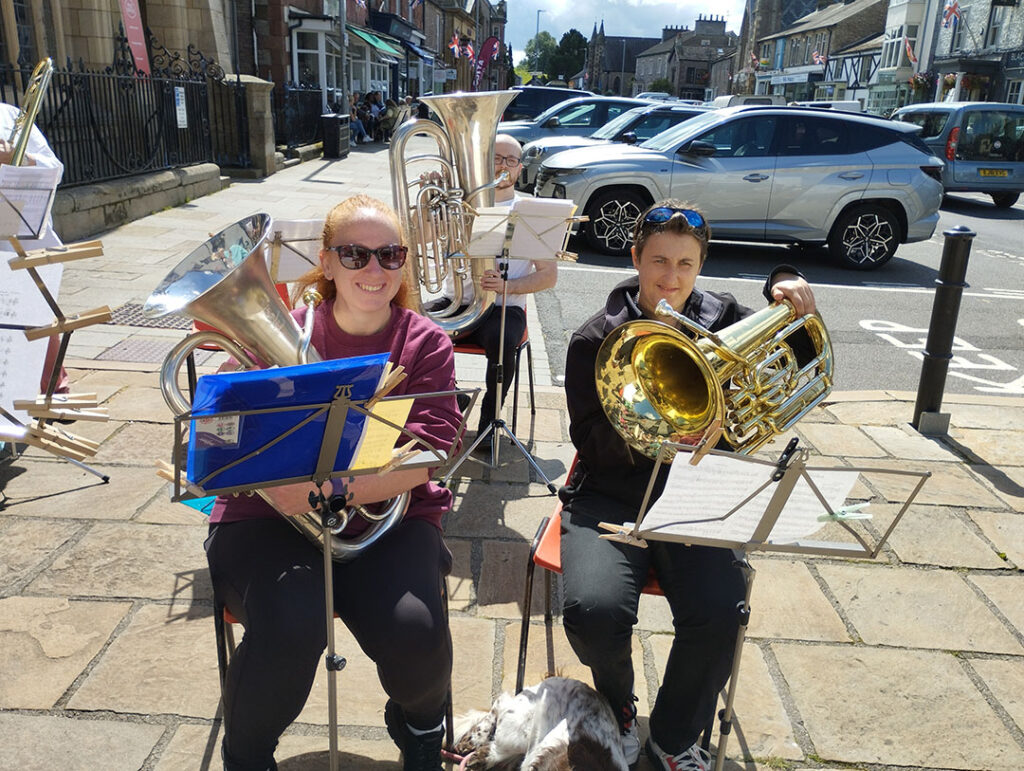
Guided conversation at the Kirkby Stephen Silver Band Brass Weekender 2nd August 2025
By Julie Hoggarth
The Local Heroes group spent a day with Tabby Kerwin’s PERFORM for Brass Bands programme. It was so useful to think about the emotional aspects of playing, that Cassie suggested we include a related session at the Kirkby Stephen Brass Weekender. This was the first of three events we are planning and delivering during this pilot project.
And, on a sunny Saturday 2nd August, 11 players from a range of bands with differing levels of playing experience, gathered in the band hut garden.
Julie kicked off the conversation about the ups and downs of picking up a brass instrument by inviting players to write down three things they love and three challenges.
What followed was a deep exploration into the why-do-we-feel that, how can we bottle the good and get over the challenges.
Things we love:
How it makes you feel, it lifts your mood, it’s fun
It’s good for the brain
The community of players and feeling of being in a team
It builds your confidence, you get a sense of achievement
Our lovely shiny instruments!
Barriers include:
Fear of being judged
Feeling not good enough
Fear of failing
Feeling like we don’t belong (and we really want to belong)
Fear of being too old
All these fears relate to what we expect of ourselves.
There are external challenges too:
Previous negative experiences
There’s a lack of understanding of mental health, or it’s seen as not belonging in the bandroom
Pre-defined beliefs in bands can be off-putting
Cost
Time
But help, as we discovered, is available
Some of it is to do with asking where our fears come from and finding them to be illusory. For instance we asked if one can be too old to start learning an instrument and the evidence (in the group and more widely) suggests you are never too old.
Dyslexia is a very common barrier. It is much harder for players with dyslexia to read music and sight reading can be overwhelmingly challenging. This can be eased with coloured paper or transparent overlays and, as one player said in the feedback, listening to the band while looking at the sheet music is extremely informative, and you can pick up navigation and anchor points that way.
Much of the fear of performing was seen to be illusory. Looking at the daily achievements and mental rewards that we cited: joy in our instruments, feeling great when playing etc, it became clear that these rewards are super-valuable and available instantly.
Some external pressures can also be solved by shifting our perspective. The PERFORM programme offers a lot of help with time management for instance. (See resource list)
The biggest help was found to be talking openly like this, in a group. We looked around in surprise as we realised how universal our fears were. And how, as a group, we can bring together ways of getting around those fears.
Meditation, yoga and shamanic journeying were discussed. Deep breathing is at the heart of this, as it is for brass playing. There’s a synergy there which is worth exploring in future events.
Keeping oneself emotionally well takes practice, as does learning an instrument. The practice does not end. Practicing to be well takes effort and focus just like practicing our music.
We practiced saying no as advised by Dr Sunita Sah in How to say ‘no’: The power of defiance, Speaking of Psychology. This had popped up on the radio that morning and it’s useful to note that help is all around us.
On a side note, I couldn’t do it, even in rehearsal mode. But it’s ok, because with practice, we get better, whatever it is we practice.
We agreed it’s ok to go at your own speed and take satisfaction in your own achievements.We agreed that you have to trust yourself, your process and your environment, to get the best results.
Then we moved to practical concerns:
Learning to play an instrument may be hard and slow but there are plenty of aids around. We pooled our favourite resources and these are shared here.
Practice aids:
Melody books
Scale books
Mnemonics for rhythms
Studies, e.g. Arban (is available digitally)
Inspirational sounds e.g. River City Brass on YouTube
Playscore – will read and play sheet music for you)
TomPlay – sheet music titles with backing tracks
At the end of the session we felt good about sharing our fears, and we felt that we trusted one another more.
And our concert went brilliantly!
